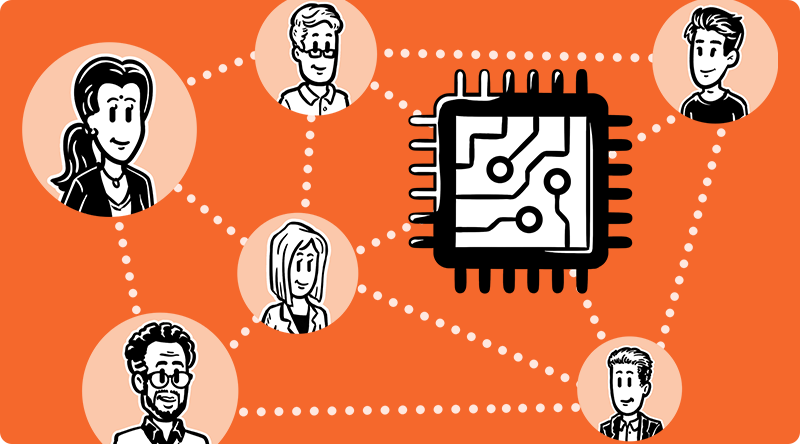AI in project management: A complete walkthrough
Written by
Irov Vaul | 15th December 2023

Artificial Intelligence (AI), the game-changing technology as we know it, is slowly revolutionizing every industry. It has emerged as a valuable technology in the workplace, transforming the way projects are scheduled, implemented, and delivered.
AI in project management has the potential to expedite project deliveries, ensuring better and more efficient outcomes. From information gathering to risk evaluation and even resource allocation, AI tools can easily manage all aspects of project management.
In the PMI Annual Global Survey on Project Management 2023, 21% of surveyed leaders reported using AI in project management. Additionally, 82% of senior leaders claimed that AI will have a major impact on how projects are implemented in their organization over the next five years. Sounds promising, doesn’t it?
Art marketing is the process of creating interest in a piece of artwork and/or building a brand for artists and art institutions. It plays a critical role in spreading the word about new pieces/artists and translating artistic narratives and concepts into something that connects to an artist’s target audience.
AI in project management has the potential to expedite project deliveries, ensuring better and more efficient outcomes. From information gathering to risk evaluation and even resource allocation, AI tools can easily manage all aspects of project management.
In the PMI Annual Global Survey on Project Management 2023, 21% of surveyed leaders reported using AI in project management. Additionally, 82% of senior leaders claimed that AI will have a major impact on how projects are implemented in their organization over the next five years. Sounds promising, doesn’t it?
Art marketing is the process of creating interest in a piece of artwork and/or building a brand for artists and art institutions. It plays a critical role in spreading the word about new pieces/artists and translating artistic narratives and concepts into something that connects to an artist’s target audience.
In this blog, we will cover everything related to AI in project management and how it can help you attain better results.
Automating Project Planning
Careful planning and scheduling are among the most intricate aspects of project management. In the past, these aspects were subject to human experience and intuition. However, the emergence of AI has revolutionized it by deploying intelligent data-driven optimization techniques.
AI technology leverages massive volumes of data from previous projects to formulate near-perfect plans. It considers a myriad of limitations simultaneously, including but not limited to:
Taking a vast range of factors into consideration, AI-powered algorithms help to improve project management efficiency and reduce the risk of delays or cost overruns.
AI technology leverages massive volumes of data from previous projects to formulate near-perfect plans. It considers a myriad of limitations simultaneously, including but not limited to:
- Resource availability, skills of the existing workforce, and workload balances
- Budget constraints and deadlines
- Task dependencies
- Potential roadblocks that may hamper project delivery
Taking a vast range of factors into consideration, AI-powered algorithms help to improve project management efficiency and reduce the risk of delays or cost overruns.
Intelligent Decision Support
AI is transforming project management by facilitating smart, data-driven decisions. Instead of relying solely on intuitions and assumptions, project managers can leverage AI’s analytical capabilities to make intelligent decisions leading to improved outcomes.
Using techniques such as machine learning, AI tools can swiftly analyze huge amounts of historical and real-time project data to identify critical patterns and insights. These data-backed insights support smart decision-making, crucial for managing big projects well.
For instance, Netflix, the popular OTT platform demonstrates one of the best AI in project management examples. The brand uses AI not only to keep the customers satisfied but also to make decisions on its internal projects. It leverages AI algorithms to decipher big data, identify what the users like, and then use those insights to develop informed marketing plans.
Using techniques such as machine learning, AI tools can swiftly analyze huge amounts of historical and real-time project data to identify critical patterns and insights. These data-backed insights support smart decision-making, crucial for managing big projects well.
For instance, Netflix, the popular OTT platform demonstrates one of the best AI in project management examples. The brand uses AI not only to keep the customers satisfied but also to make decisions on its internal projects. It leverages AI algorithms to decipher big data, identify what the users like, and then use those insights to develop informed marketing plans.

Facilitating Collaboration and Communication
Collaboration is the keystone of successful project management. There are plenty of AI project management tools available nowadays that augment team collaboration by streamlining communication and coordinating tasks.
For instance, remote teams can leverage AI-powered video conferencing tools to enhance their virtual meetings. These tools offer an array of features such as facial recognition, AI text-to-speech, and language translation for seamless collaboration.
Similarly, several AI video makers and explainer videos can streamline complex tasks. They can automate the creation of engaging videos for quick knowledge transfer, onboarding of new members, documenting best practices, and much more.
For instance, remote teams can leverage AI-powered video conferencing tools to enhance their virtual meetings. These tools offer an array of features such as facial recognition, AI text-to-speech, and language translation for seamless collaboration.
Similarly, several AI video makers and explainer videos can streamline complex tasks. They can automate the creation of engaging videos for quick knowledge transfer, onboarding of new members, documenting best practices, and much more.
Monitoring and Reporting
Real-time project monitoring and reporting through AI is a transformative tool for many project managers. Regular reporting is a particularly time-consuming task, especially in big firms where several projects are going on at the same time.
Let’s take an example here. Say you are a project manager at a mattress company like Amerisleep, and you have to compile a report listing Amerisleep’s top 10 mattresses by customer satisfaction and create a visual representation of this data, a task that could consume a significant amount of time and effort. Even with sophisticated tools like Microsoft BI, numerous queries are typically required to obtain the desired insights.
AI revolutionizes this process. By seamlessly connecting AI to real-time customer feedback and preferences, you can simply instruct any AI tool to “list the top 10 mattresses by customer satisfaction and create a visual representation.” In a matter of minutes, the AI accomplishes the task, ensuring that the information is not only accurate but also up-to-the-minute, echoing the efficiency it brings to project management reporting.
Let’s take an example here. Say you are a project manager at a mattress company like Amerisleep, and you have to compile a report listing Amerisleep’s top 10 mattresses by customer satisfaction and create a visual representation of this data, a task that could consume a significant amount of time and effort. Even with sophisticated tools like Microsoft BI, numerous queries are typically required to obtain the desired insights.
AI revolutionizes this process. By seamlessly connecting AI to real-time customer feedback and preferences, you can simply instruct any AI tool to “list the top 10 mattresses by customer satisfaction and create a visual representation.” In a matter of minutes, the AI accomplishes the task, ensuring that the information is not only accurate but also up-to-the-minute, echoing the efficiency it brings to project management reporting.
Challenges and Considerations
While the benefits of AI in project management are undeniable, it also comes with its fair share of challenges. Integrating AI in project management necessitates careful research, planning, and an understanding of potential obstacles:
Data quality and integration: AI systems largely rely on the volume, variety, and quality of data fed to them. If the data is of poor quality or insufficient, it can directly influence the insights generated, resulting in biased or inaccurate outcomes.
Ethical and bias concerns: AI algorithms can unintentionally perpetuate biases that may occur in their training data, leading to unfair outcomes. Additionally, it is important to outline ethical guidelines for AI usage to avoid misuse of private and confidential data.
Change management and adoption: Integrating AI into your current project management processes is a huge change and may face resistance from existing team members. This may be due to a lack of understanding. It is crucial to provide adequate training and ensure clear communication for a seamless adoption of AI.

Future Trends in AI and Project Management
Despite these challenges, companies will continue to implement AI in project management for better efficiency and productivity. Some of the ways AI is expected to influence project management in the future include:
Automating admin tasks: AI has the potential to automate all mundane tasks, such as generating reports or scheduling meetings. Additionally, AI-driven tools can intelligently allocate resources, predict project timelines, and identify potential risks.
Leveraging predictive analytics: As per statistics, 70% of all projects fail. However, with AI and predictive analytics, project managers can identify projects with the highest anticipated success rate, and consequently prioritize their efforts.
Optimization of resources: The role of AI in project management is to optimize the allocation of resources, resulting in effective utilization. In the future, AI will ensure optimal project execution by better utilization of a company’s human resources.
Conclusion
AI in project management demonstrates immense potential. Right from effective decision-making and resource optimization to enhanced productivity and efficient risk mitigation, AI can drastically streamline project management.
However, there are some drawbacks to consider – ethical concerns, biases, adoption challenges, and security risks. Therefore, it is crucial to understand the intricacies of the concept and carefully navigate the potential pitfalls to ensure desirable outcomes.
However, there are some drawbacks to consider – ethical concerns, biases, adoption challenges, and security risks. Therefore, it is crucial to understand the intricacies of the concept and carefully navigate the potential pitfalls to ensure desirable outcomes.
Author's bio

Irov is a content marketing specialist, demand generation enthusiast, and team player who is currently working with 2xSaS. He helps B2B SaaS companies spread the word about their products through engaging content.
